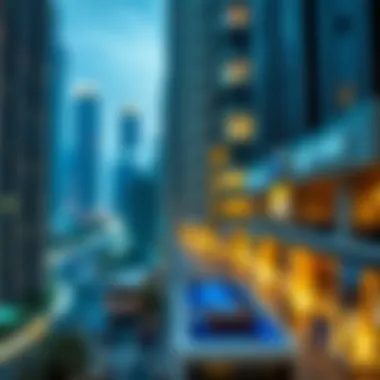Monthly Cost of Living in Dubai: A Complete Guide


Intro
Understanding the cost of living in a city as vibrant as Dubai is essential for anyone considering a move here. Dubai is a melting pot of cultures and opportunities, attracting expatriates and investors from across the globe. However, entering a new city also comes with its fair share of expenses, and being clued in on the financial landscape is crucial.
This article promises to be your friendly guide through the labyrinth of costs you may encounter monthly in Dubai. From the rent you’ll pay for your apartment to the price of your morning coffee, we’ll break down the key areas of expenditure. It’s not just about numbers; it’s about understanding how to align your budget with your lifestyle in this dynamic city.
We will explore various essential expenditures: housing, utilities, transportation, and daily lifestyle choices. Each of these elements can impact your overall financial commitments. Thus, it pays dividends to know where your money will go.
What’s Ahead
As we dive deeper into this topic, you will gain insights on market trends specific to real estate, the general cost of living trends, and how they might fluctuate over time. Additionally, if you’re in the market to purchase property here, we’ll share practical buying guides alongside legal considerations—all aimed at providing a holistic understanding of your financial obligations while living in Dubai.
Ultimately, we’ll synthesize the information to offer strategic advice that caters to your needs as an expatriate, investor, or individual preparing for life in a city that dances between tradition and modernity.
Prelims to Dubai's Cost of Living
Understanding the cost of living in Dubai is crucial for anyone considering a move to this vibrant and bustling city. For expatriates, investors, and even residents looking to manage their budget, having a clear grasp of the various expenses involved is essential. The financial landscape in Dubai can be quite different from other cities, influenced by a myriad of factors such as lifestyle choices, housing availability, and market trends.
One cannot overlook that Dubai is known for its luxurious lifestyle, and while some perceive that as only high-end living, there exists a broad spectrum of options to cater to diverse needs. From lavish villas to more modest apartments, the key takeaway here is that understanding your expected monthly expenses can aid in crafting a realistic financial plan. This knowledge becomes critical, especially for newcomers acclimating to the cultural and economic nuances of life in Dubai.
The benefits of dissecting the cost of living extend beyond mere budgeting. For possible investors, comprehending the housing market can illuminate investment opportunities in real estate. For those coming for work, knowing how much to set aside for living expenses helps in negotiating salaries that reflect the local market conditions.
When we delve into specific elements of Dubai’s monthly costs—housing, utilities, transportation, and more—we begin to see how these components interact to shape an individual’s or family’s financial obligations. By communicating these aspects effectively, this article aims to provide a well-rounded view to assist readers in making informed decisions.
Collectively, an insightful understanding of living costs not only prepares one for practical living arrangements but also opens doors to cultural experiences and community engagement. In a city where East meets West, it's essential to blend financial comprehension with the broader lifestyle context to truly thrive.
"Budgeting is about more than just expenses; it’s about finding a fit for a life you want to lead."
Thus, as we journey through this guide, it will become apparent just how pivotal a role these financial insights play in navigating life in Dubai.
Housing Expenses
Understanding housing expenses in Dubai is crucial for anyone contemplating life in this lavish city. These costs will form a substantial portion of your monthly budget, whether you are an expatriate, investor, or local resident. Housing choices will greatly influence your comfort, lifestyle, and financial stability. Factors to consider are location, type of accommodation, and the overall rental market dynamics.
Rental Market Overview
The rental market in Dubai is as dynamic as the city itself. With an ever-growing population, demand for housing continues to rise, and rental prices can fluctuate quite a bit depending on various influencers. Areas like Downtown Dubai and Dubai Marina command premium prices due to their central locations and amenities. In contrast, areas farther from the city center tend to offer more affordable options.
Research suggests that understanding these trends is pivotal for potential renters to find suitable accommodations without breaking the bank. It’s like fishing in troubled waters; one must know where to cast the net to catch the right catch.
Types of Accommodations
Apartments
Apartments are perhaps the most common and accessible type of housing in Dubai. They come in various sizes and styles, and cater to different income levels. The allure of apartments is their proximity to amenities like shopping malls, gyms, and public transportation.
A key characteristic of apartments is their often luxurious facilities, including swimming pools, gyms, and security services. This makes them a popular choice for young professionals and families alike. However, one must consider that living in an apartment means sharing walls with neighbors, which may impact your privacy and peace.
Villas
Villas offer a different statement. They are known for spaciousness, privacy, and often come with gardens and private pools. Many families or those seeking a quiet environment prefer villas as they provide a home-like feeling. However, villas might not always be budget-friendly. Their rental prices can vary significantly based on location and amenities available. The sheer space and private facilities can also mean higher maintenance costs, which should not be overlooked.
Shared Housing
Shared housing is often a practical choice for students and those just starting in their careers. Living with roommates allows individuals to split costs, making it easier to manage monthly expenses in a city known for its high living costs. A standout feature of shared housing is the camaraderie it often fosters. Individuals can benefit from a social environment that mitigates the loneliness of moving to a new city. However, it also requires some adaptability and compromise in terms of shared spaces and lifestyle habits.
Average Rent Prices
Rent prices in Dubai can be quite the roller-coaster after all. As of late 2023, studio apartments in prime neighborhoods can command upwards of AED 5,500 monthly, while the same in less popular districts might hover around AED 3,500. Larger accommodations like villas can range from AED 10,000 to AED 20,000 depending on their location and style.
Understanding this landscape is vital for anyone hoping to navigate the waters of Dubai’s housing market successfully, as it equips individuals with the knowledge needed to make informed choices.
Utilities and Services
When considering the cost of living in Dubai, utilities and services often sneaks under the radar. However, they form a vital part of monthly expenses that can significantly impact your budget. Understanding how these costs stack up is crucial for anyone contemplating life in this vibrant city, whether you're an expatriate, investor, or simply looking to establish your home. This section delves into essential utilities like electricity, water, internet, and mobile services. It also provides insight into how to manage these elements effectively, ensuring you stay on top of your bills in a city renowned for both luxury and rapid development.
Electricity and Water
The cost of electricity and water in Dubai can be a common concern for residents. The climate plays a major role, especially during sweltering summer months when air conditioning units work overtime. Generally, the average monthly cost can range from AED 400 to AED 1,500, depending on family size and lifestyle.


One critical element to consider is the government's commitment to subsidizing utilities. While this helps keep costs manageable, fluctuating usage can lead to surprises in monthly bills. For those with families or multiple appliances running at once, conservation is key. Simple strategies like turning off appliances when not in use or utilizing energy-efficient products can bring down those figures.
Water consumption is also pivotal, particularly because any excess usage can lead to higher fees imposed by the Dubai Electricity and Water Authority (DEWA). Effective water management is not just an economical move; it's a responsible choice in a city often facing challenges related to resource sustainability.
Internet and Mobile Services
Communication is key, especially in a city like Dubai where many people stay connected across borders. Mobile and internet services are widely available, but costs can be a bit all over the place. Monthly charges for internet plans typically range between AED 300 to AED 800 depending on speed and provider. Major players like Etisalat and du offer varying packages, so it’s essential to shop around and pick a plan that fits your needs best.
For mobile services, the plans are quite straightforward. Prepaid and postpaid options exist, and for average usage, you might end up spending around AED 100 to AED 500 monthly. While it’s tempting to go for the flashiest plan, keeping an eye on your data consumption and calls can lead to significant savings. When staying long-term, some residents opt for bundled services that combine internet, television, and mobile — potentially streamlining costs.
Monthly Costs Overview
To sum it all up, when calculating your total monthly expenses for utilities and services, it’s wise to consider a budget that reflects a combination of electricity, water, internet, and mobile services. Here’s a quick breakdown:
- Electricity and Water: AED 400 to AED 1,500
- Internet Services: AED 300 to AED 800
- Mobile Plans: AED 100 to AED 500
By doing a little homework and keeping an eye on these utilities, newcomers to Dubai can navigate their monthly expenses better. The important thing is to assess your own consumption habits and adjust accordingly.
If you’re eager to dive deeper into specific providers or get real-time updates on utility costs, resources such as DEWA or local discussions on Reddit could offer more insights from fellow residents.
Overall, grasping these utility costs can smooth out the often bumpy road of budgeting in Dubai, allowing for a clearer picture of what life will entail financially.
Transportation Expenses
It is important to consider public transport, the cost of owning a car, and fuel prices as key components in this discussion. Each of these elements presents unique benefits and potential drawbacks that can affect one’s budget and lifestyle.
Public Transport Options
Dubai boasts an efficient and modern public transport system, which includes the Metro, buses, and water taxis. The Dubai Metro is particularly notable for its reliability and coverage, making it a popular choice for daily commuters. The red and green lines connect key areas, including major business districts and tourist hotspots.
- Metro: Fast, clean, and air-conditioned, the Metro service operates frequently, with trains arriving every few minutes during peak times.
- Buses: This service complements the Metro and provides transport across a broader area. They connect with the Metro stations and are generally cost-effective.
- Water Taxis: For those living along the waterfront, water taxis offer a unique and picturesque commuting option.
The cost for a monthly pass on the Metro is around AED 300, making public transport an attractive option compared to the expensiveness of owning a car in Dubai.
Cost of Owning a Car
While public transport serves many well, some individuals may prefer the convenience of having their own vehicle. Owning a car in Dubai comes with its unique set of financial obligations that need to be taken into account:
- Initial Purchase Cost: The price of cars varies widely, with new vehicles starting from around AED 40,000 and going up significantly, depending on the model and brand.
- Insurance: Mandatory car insurance can cost between AED 2,000 and AED 6,000 annually.
- Maintenance: Regular maintenance is crucial. Basic servicing costs can range from AED 500 to AED 1,500, depending on the car type and service required.
- Parking Fees: Consideration should also be given to parking fees, which can accumulate if your workplace or residence lacks dedicated parking spaces.
While having your own wheels offers flexibility, it’s wise to budget thoroughly to avoid the financial bite.
Fuel Prices
Fuel prices in Dubai are relatively low compared to many global cities. As of recent reports, the price per liter of petrol hovers around AED 2.300, which is competitive against international norms. This price, however, can fluctuate based on various factors, including global oil prices and local taxes.
- Fuel Efficiency: Investing in a fuel-efficient vehicle can yield long-term savings, particularly if you drive frequently.
- Electric Vehicles: With government incentives for electric cars, these can present a cost-effective alternative, especially considering lower running costs.
"Smart transportation choices can transform your financial landscape in Dubai's vibrant city life."
For more detailed information on transportation in Dubai, you can refer to Wikipedia - Transportation in Dubai.
Also, check The Roads and Transport Authority of Dubai for updates on public transport and pricing.
Grocery and Dining Costs
When evaluating the cost of living in Dubai, grocery and dining expenses play a crucial role. For expatriates and local residents alike, understanding these costs can be a game changer in budgeting effectively. It isn't just about the price tags on items or meals; it’s also about lifestyle and personal preferences. Engaging with the local cuisine might become a delightful routine, while grocery shopping can reflect daily habits and family needs. Knowing what to expect can help newcomers navigate their financial commitments without breaking the bank.
Average Grocery Prices
Grocery shopping in Dubai can vary quite a bit depending on where you choose to shop. Generally, supermarkets such as Carrefour, Spinney's, and Lulu Hypermarket offer a wide range of products at competitive prices. You might find that imported goods, especially organic and specialty items, are pricier here than in some Western countries. For instance, a liter of milk may cost around AED 5, whereas a loaf of bread averages AED 3.50. Here’s a more detailed rundown of common grocery items:
- Rice (1kg): AED 7 to AED 15
- Chicken (1kg): AED 20 to AED 30
- Eggs (12): AED 15 to AED 20
- Tomatoes (1kg): AED 6 to AED 10
Remember, shopping in smaller local markets can sometimes yield better prices, especially for fruits and vegetables. Don't be surprised if you come across some real bargains if you're open to exploring the less-traveled markets in various neighborhoods.


Dining Out: Restaurant Options
Dining out in Dubai offers a plethora of options that can accommodate every budget, from street food to fine dining. On the cheaper end, you can grab a shawarma for around AED 10, while a decent meal at a mid-range restaurant may set you back by AED 80 to AED 150 for two persons. Take your pick from cuisines ranging from Arabic, Indian, Thai to fast-food chains.
Unique dining experiences are plentiful too: for instance, trying out a meal at a floating restaurant in Dubai Marina or enjoying a sushi night at a rooftop venue with stunning skyline views can cost anywhere between AED 300 and AED 600 for a complete dinner for two – a worthwhile investment for the experience. Here are some notable restaurant options to consider:
- Local eateries: Affordable and delicious, serving traditional Emirati dishes.
- Casual dining chains: A range of international cuisines available at reasonable prices.
- Luxury restaurants: For special occasions, expect to pay a premium but enjoy world-class culinary experiences.
Comparative Cost of Dining
When comparing dining costs, it’s essential to consider both the variety and quality of food available. A typical lunch at a budget eatery can be around AED 30, while a fine dining experience could push costs over AED 300. The important thing here is to reflect on what suits your lifestyle and dietary preferences.
In fact, many expatriates often opt for a mix of grocery shopping and eating out, tailoring their choices based on monthly budgets. Perhaps sticking to home-cooked meals during weekdays while savoring local dining options on weekends can strike a balance.
Tip: Register for loyalty programs or discounts at local supermarkets and dining venues to save more on groceries and meals. It pays off in the long run!
Regardless of personal choices, understanding grocery and dining costs provides a clearer perspective on budgeting for life in Dubai. Being mindful about your spending habits can enrich your experience of this vibrant city.
Healthcare Expenses
When considering a move to Dubai, understanding health care expenses is crucial for expatriates and investors alike. Health care in Dubai is known for its high standards, yet it comes with a price tag that can catch newcomers off guard. This section will break down the types of health coverage available and give insight into the costs that residents can expect.
Health Insurance Options
One of the first decisions anyone moving to Dubai should make involves health insurance. The United Arab Emirates mandates that all residents have health insurance, which means that getting the right coverage isn't just wise—it's required. Residents can choose from an array of health insurance plans that vary widely in terms of coverage and price. You might find plans focusing on outpatient services, hospitalization, and even specific treatments.
- Local providers: Several local companies like Daman and Al Ain Ahlia offer tailored plans for expatriates, making it easier to find one that suits your unique needs.
- International coverage: If you plan to travel frequently or want to ensure you're covered in your home country, consider global insurance providers like Cigna or Allianz. This broad coverage adds peace of mind, although it generally comes at a steeper price.
- Employer-sponsored plans: Many companies provide health insurance as part of employee benefits. This can significantly reduce personal out-of-pocket expenses, but it's essential to understand what the plan covers.
Overall, the choice of which health insurance option to go with depends largely on personal circumstances, including considerations such as family size, medical history, and lifestyle choices.
Average Medical Costs
Once you’re roughly sorted with your health insurance, you need to get a grip on average medical costs in Dubai. Though the health care system is advanced, the costs can be quite a shock if you're not prepared. Here's a glimpse:
- Consultation fees: Visiting a general practitioner might set you back anywhere from AED 150 to AED 400, depending on the clinic's prestige.
- Emergency care: If you ever find yourself in a pinch, emergency services can cost between AED 500 and AED 1,200, excluding any procedures or treatments needed afterwards.
- Specialized services: Seeing a specialist can start from AED 300 and can easily exceed AED 1,000 for exclusive clinics.
It’s wise to keep some emergency funds handy as medical costs can stack up fast in Dubai, especially if you need tests, medications, or ongoing treatments.
Many people complain about high prices, but remember, the quality of care is often reflected in these costs. Seeing a top-tier doctor or receiving treatment at a well-regarded facility may provide benefits that cheaper options just can't match.
"Investing in health is investing in a quality life. The hospital experience here might come with a price, but it can save your life or the life of a loved one."
Understanding these elements can help in planning your budget effectively while living in Dubai. It’s always better to be informed than to be taken by surprise. Consider researching insurance terms and have a solid grasp of expected medical expenses before making significant moves.
Education Costs
Adjusting to life in Dubai does not just involve understanding housing or transportation; it significantly involves the choices regarding education, especially for those relocating with families. Education costs in Dubai can be somewhat of a maze, presenting vital considerations for expatriates and investors alike. Choosing between public and private schools can shape not just one’s budget, but ultimately the educational experiences available for children. With the right information, parents can navigate this terrain effectively, allowing their kids to thrive in a new environment.
Public vs. Private Schools
When weighing options for schooling, the contrasting dynamics between public and private institutions stand out. Public schools in Dubai are primarily funded by the government and cater predominantly to Emirati students. They operate under a curriculum that is largely Arabic, with some provisions for subjects taught in English. International families, therefore, may find public options to be less suitable due to language barriers and curriculum differences.
On the flip side, private schools are quite numerous and varied in Dubai. They often follow international curricula such as the British, American, or IB programs. This flexibility allows expatriates to choose schools that align closely with their home country's educational system.
Some distinctions to consider include:
- Admission Costs: Several private schools request enrollment fees, which can be a significant initial payment.
- Diversity: Private schools tend to have a more international student body, providing a multicultural experience.
- School Facilities: Many private institutions boast impressive facilities, including modern sports complexes and extracurricular programs.
Investing in an education can be costly; thus, thoroughly exploring these options may yield rich long-term benefits as children adapt to life in the UAE.
Annual Tuition Fees
Annual tuition fees can swing widely, depending on the institution type and its prestige. This aspect can shake up even the sturdiest of budgets.
Here are some insight into expected fees:


- Public Schools: Tuition here is often minimal since they are state-funded. However, there can still be additional costs for uniforms, books, and extracurricular activities.
- Private Schools: Tuition can range dramatically. On average, it generally starts from about AED 20,000 and can go all the way up to AED 100,000 or more for elite institutions.
"Parents should anticipate not just the tuition but additional costs that might arise, such as admission fees, uniforms, and supplies."
Factors influencing tuition often include the school's reputation, facilities offered, and location within Dubai, with schools in central areas typically costing more. To outline some typical ranges:
- Budget schools: AED 20,000 - AED 30,000
- Mid-range schools: AED 30,000 - AED 60,000
- Premium schools: AED 60,000 - AED 100,000+
All in all, understanding and planning for these educational costs will go a long way toward achieving a smooth transition to life in Dubai, ensuring families secure the best possible start for their children in this vibrant city.
For deeper insights on schooling in Dubai, refer to the KHDA website.
Also, parents might check forums such as Reddit for personal anecdotes and recommendations.
Leisure and Entertainment Expenses
When considering the monthly cost of living in Dubai, leisure and entertainment expenses play a key role in shaping the overall experience of expatriates and locals alike. Unlike many other places in the world, where the cost of living may predominantly revolve around essential needs, in Dubai, the lifestyle you choose can significantly influence your monthly budget. Therefore, understanding the nuances of these costs is pivotal for anyone planning to make this vibrant city their home.
Dubai is known for its lavish lifestyle and a plethora of entertainment options. From opulent shopping malls and fine dining establishments to cultural events and outdoor adventures, the scope for leisure is immense. Delving into the cost of movies, events, sports, and outdoor activities gives valuable insight into not just what one can enjoy but also how to budget effectively for quality leisure time.
Cost of Movies and Events
Catching a flick or attending an event in Dubai can offer a delightful escape from the day-to-day grind. Movie tickets typically range from 35-50 AED, depending on the cinema chain and the type of screening. However, if you're looking for luxury, certain cinemas offer premium experiences that can cost upwards of 100 AED.
Events such as concerts or arts festivals can vary dramatically in prices. For instance, popular acts may charge from 250 AED for a standing ticket to over 1000 AED for VIP access. Notably, large-scale festivals like Dubai Shopping Festival or Duba Art Season often feature free concerts and events, making them an excellent way to enjoy entertainment on a budget.
"Dubai frequently hosts events that can range from culturally enriching to outright extravagant; it’s a city where entertainment knows no bounds."
Sports and Outdoor Activities
If movies aren’t your cup of tea, you could explore sports and outdoor activities. Dubai’s climate permits a variety of outdoor adventures year-round, from beach outings to desert safaris. Basic activities like visiting parks are often free, but organized sports events and lessons can add up. For example, joining a local dance class or engaging in a kite-surfing lesson could mean setting aside around 200-500 AED per session.
In addition, Dubai is home to state-of-the-art sporting facilities, as seen in outdoor desert activities. The price for a thrilling desert safari can range from 150-400 AED per person. This generally includes transportation, food, and sometimes even cultural shows, making it a worth-it expense.
Outdoor fitness is also quite celebrated, you'll find many free community events like yoga in public parks. If you prefer something organized, gym memberships can range from 200-800 AED monthly depending on the location and facilities.
In summary, leisure and entertainment expenses in Dubai cover a wide spectrum, accommodating various tastes and budgets. Should you choose to indulge frequently, it’s essential to effectively strategize your finances to harmonize enjoyment with practicality.
Summary of Monthly Costs
Understanding the monthly costs involved in living in Dubai is paramount for anyone considering setting up shop in this vibrant metropolis. It boils down to making informed financial choices that can significantly impact your quality of life. As the saying goes, "A penny saved is a penny earned." This couldn't be more relevant when navigating the financial waters of Dubai.
Dubai presents a diverse financial landscape that holds various expenses waiting to be unearthed—housing, utilities, transportation, food, healthcare, education, and entertainment each play a considerable role in your overall expenditure. With a commitment to transparency, dissecting the monthly cost breakdown offers a clear lens into what you really need to budget for.
Breakdown of Average Monthly Budget
Knowing the average monthly budget is like having a map in uncharted territory—indispensable and incredibly helpful. Below is a detailed look at the different components that generally make up the average monthly budget for living in Dubai.
- Housing Costs: Approximately 30-50% of your budget often goes to housing, whether it’s rent or mortgage payments. Rent for a one-bedroom apartment in the city center can be steep—sometimes ranging between AED 5,000 to AED 10,000 (or even higher, depending on the area).
- Utilities: Budgeting for electricity, water, and cooling is critical. UAE summers can be blistering hot, so cooling costs can run around AED 400 to AED 600 monthly.
- Food and Dining: Expect to allocate about 20-30% of your budget here. Groceries can cost upwards of AED 1,000 a month for a single individual, while dining out can be significantly more, depending on where you go.
- Transportation: Whether commuting via public transport or owning a car, these costs can vary widely. On average, public transport expenses may hover around AED 300 to AED 500, while car ownership could double that amount at a minimum.
- Healthcare and Insurance: Allocating about 10-15% for health coverage is wise. Health insurance typically ranges anywhere from AED 500 to AED 1,500 a month, depending on coverage.
- Leisure and Entertainment: Setting aside around 5-10% of your budget for entertainment expenses can enrich your Dubai experience, from outdoor activities to cultural events. Expect to spend around AED 300 to AED 1,000.
"Being informed about your average monthly costs can save you from falling into financial traps, enabling you to enjoy the best of what Dubai has to offer without breaking the bank."
To summarize, paying close attention to the breakdown of the average budget can equip you with the knowledge necessary to thrive economically in Dubai. The city is not just a pretty facade for rich lifestyles; it requires prudent financial planning. You’ll find that understanding these costs will allow you to adjust your lifestyle choices according to your financial reality, making this extravagant city feel just a touch more manageable.
Final Considerations
When examining the monthly cost of living in Dubai, the Final Considerations section represents a pivotal moment of synthesis. It wraps together all the budgeting insights and lifestyle implications we've discussed throughout the article. Understanding these final elements ensures that individuals moving here, whether for work, education, or investment, have a clear viewpoint of their financial landscape.
One of the key benefits of this section is the way it highlights the fluctuating nature of living costs in Dubai. For instance, while rent prices might seem steep in prime areas like Dubai Marina or Downtown, other costs, such as eating out or entertainment, can provide options to fit various budgets. Grasping this balance can aid not just expatriates but also investors and homebuyers in strategizing their financial footprints effectively.
Tips for Budgeting in Dubai
Budgeting in Dubai often needs to be more than just math. It’s about understanding the rhythm of city life and planning accordingly. Here are several handy tips:
- Understand Your Payment Cycle: Rent in Dubai is typically paid yearly or quarterly. Therefore, aligning your savings to accommodate these large payments is crucial.
- Use Apps for Tracking Expenses: Utilize budgeting apps to keep tabs on your daily expenditures. Consider apps like Expensify or Mint that offer user-friendly interfaces.
- Set an Emergency Fund: Unexpected costs can spring up, from medical emergencies to spontaneous trips. A safety net of 3-6 months of expenses can keep your budgeting on track.
- Explore Cost-Effective Grocery Shopping: UAE has local markets and supermarkets like Carrefour or Lulu Hypermarket offering deals. Don’t shy away from looking for items on clearance or buying larger packaging for savings.
“Remember, budgeting isn’t just about restriction; it’s about making your money work for you.”
Adjusting to Life in Dubai
Transitioning to life in Dubai can be an exhilarating yet challenging journey. Newcomers might find the cultural diversity and fast-paced lifestyle both refreshing and overwhelming. Here are a few considerations for adjusting:
- Cultural Awareness: Familiarizing yourself with local customs is pivotal. Embrace the variety; the blend of expatriates creates a unique social fabric that is appealing.
- Join Community Groups: Engaging with community networks through platforms such as Meetup can ease the adjustment period. Whether it’s sports clubs or professional networks, they can offer support and friendship.
- Explore the City: Take time to discover different neighborhoods—each has its own character and amenities. Maybe the quietness of Jumeirah suits you more than the bustle of Deira.
- Language: While English is widely spoken, picking up a few Arabic phrases can deepen your connections with locals and show respect for the culture.















